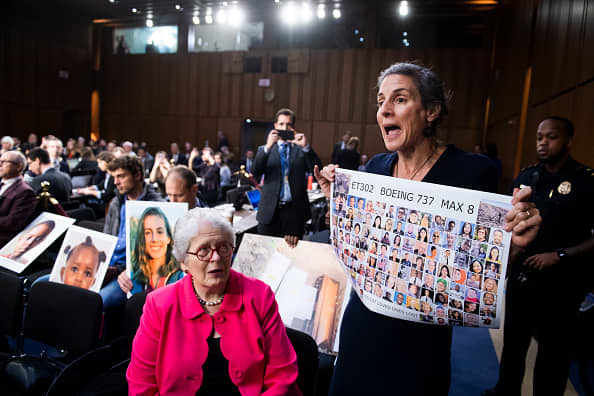
Nadia Milleron, whose daughter Samya Stumo was killed in the crash of Ethiopian Airlines Flight 302, holds a sign with photos of the crash victims during a Senate Commerce, Science and Transportation Committee hearing on aviation safety and the future of the Boeing 737 Max aircraft, in the Hart Building in Washington, D.C., Oct. 29, 2019.
Tom Williams | CQ-Roll Call, Inc. | Getty Images
A federal judge on Thursday rejected Boeing‘s plea deal tied to a criminal fraud charge stemming from fatal crashes of the manufacturer’s 737 Max aircraft.
U.S. District Judge Reed O’Connor of the U.S. District Court for the Northern District of Texas expressed concern in his decision that the selection process for a government-appointed monitor, a condition of the plea deal, would be affected by diversity, equity and inclusion policies.
He wrote that “the Court is not convinced in light of the foregoing that the Government will not choose a monitor without race-based considerations and thus will not act in a nondiscriminatory manner. In a case of this magnitude, it is in the utmost interest of justice that the public is confident this monitor selection is done based solely on competency.”
The Justice Department is reviewing the decision, a spokesperson said. Boeing didn’t immediately comment.
In October, O’Connor ordered Boeing and the Justice Department to provide details on DEI policies that might affect the selection of the monitor.
The court gave Boeing and the Justice Department 30 days to decide how to proceed, according to a court document filed Thursday.
In July, Boeing agreed to plead guilty to a criminal charge of conspiring to defraud the U.S. government by misleading regulators about its inclusion of a flight-control system on the Max that was later implicated in the two crashes — a Lion Air flight in October 2018 and an Ethiopian Airlines flight in March 2019. All 346 people on the flights were killed.
Boeing and the Justice Department didn’t immediately comment.
Victims’ family members had taken issue with a government-appointed monitor as a condition of the plea agreement, which they called a “sweetheart deal,” and sought to provide more input on the monitor’s selection.
Erin Applebaum, an attorney representing one of the victims’ family members, applauded the judge’s decision. “We anticipate a significant renegotiation of the plea deal that incorporates terms truly commensurate with the gravity of Boeing’s crimes,” Applebaum said in a statement. “It’s time for the DOJ to end its lenient treatment of Boeing and demand real accountability.”
The deal was set to allow Boeing to avoid a trial just as it was trying to get the company back on solid footing after a door panel on a 737 Max 9 blew out in midair during an Alaska Airlines flight on Jan. 5.
The new plea deal arose after the Justice Department said in May that Boeing violated a previous plea agreement, which was set to expire days after the door panel incident.
O’Connor said in his decision Thursday that it “is not clear what all Boeing has done to breach the Deferred Prosecution Agreement.”
Under the new plea agreement, Boeing was set to face a fine of up to $487.2 million. However, the Justice Department recommended that the court credit Boeing with half that amount it paid under a previous agreement, resulting in a fine of $243.6 million.
